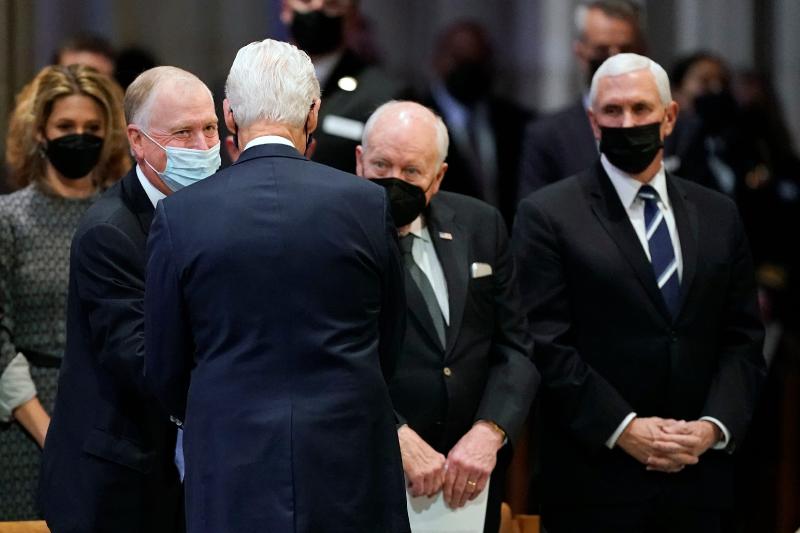What if the Jan. 6 insurrection had succeeded in illegally installing Trump?
By: David Rothkopf (MSN)


What if everyone recognized that a President-elect cannot assume office without tacit approval of Congress? The entire narrative swirls around the idea that Joe Biden could not have been inaugurated without Congressional certification of the election. And the claimed threat to democracy centers on the possibility that Congress could have overturned the election results. What everyone does not want to see and tries to hide behind a cloud obfuscating smoke is that Congress has its thumb on the scale of democracy. Congress really has assumed authority to rig elections.
What if? If Trump had remained in office through manipulating Congress then many, if not all, the states would have rejected the legitimacy of the Federal government. There would have been secession. And that secession movement would likely have resulted in a Constitutional convention. Trump remaining in office by Congressional gaming of the election would have ended two party politics. And no one, anywhere, wants to acknowledge that Congress has the ability to game elections.
The riot on Jan. 6 did not threaten the Federal government. But the riot did threaten to shine a light on how Congress has the ability to rig elections. Congress stands between the electorate and democracy. And Congress determines how much democracy is allowed.

What if the coup attempt had succeeded? What if the election results had been overturned? What if Donald Trump were illegally installed for a second term as president of the United States?
It could have happened several different ways. Capitol Police officer Eugene Goodman might have been out sick last Jan. 6 and not in place to divert the mob away from fleeing and hiding members of Congress. The Trumpist horde could have found their way to House Speaker Nancy Pelosi, Vice President Mike Pence or other members of Congress and killed or injured them.
Had they done so, it might have resulted in postponing the certification of the election and in the ensuing time, despite whatever national outrage was triggered, the former president and his supporters might have engineered politically motivated challenges in key states throwing the election's results into question.
Do you doubt that? Then your memory has faded much in the past year. Because a coup attempt occurred, five people died, more than 140 police officers were injured, for the first time in American history we did not have a peaceful transfer of power, and the backlash with the leadership and rank and file of the GOP was shockingly minimal.
A stunning blow to democracy
Just hours after the attack, 147 Republican members of Congress voted to object to the election results - although there was zero evidence of wrongful outcomes in electoral counts. Even with massive evidence of Trump's central role in promoting the uprising, only 10 House Republicans voted to impeach him. Just seven voted to convict him in the Senate.
What is more, within weeks of the assault, the leadership and rank and file of the GOP fell into line around the continued promotion of the Big Lie and the continued defense of Trump as their party's standard-bearer.
A recent poll from the University of Massachusetts Amherst reveals that 71% of Republicans don't believe Biden was rightfully elected president. Only 6% of Republicans said Biden was "definitely" the winner. About 80% of Republicans called the Jan. 6 attack "a protest."
Another poll from the Washington Post-University of Maryland showed 34% of Americans believed violent action against the government was at times justified.
This combination of gullibility or willingness to deny demonstrable facts to advance a political goal suggests that another "what if" scenario also came precariously close to succeeding.
This is the plot we are learning was being pursued by Trump supporters to get the certification stalled by peaceful means while state challenges could be pursued and - with the help of GOP legislatures, governors and judges - won. In a new memoir, Trump White House adviser Peter Navarro calls the effort "a perfect plan" and has stated, "We had over 100 congressmen committed to it." He called the plan "the Green Bay Sweep."
We do know that the effort came very close to success. For example, one key element was for Vice President Pence to refuse to certify the election results, sending them back to the states. Pence reportedly struggled with this issue, wanted to find a way to make it work, before being dissuaded by former Vice President Dan Quayle. What if Pence had ignored the advice?
© Jacquelyn Martin/AP From left, former Vice Presidents Dan Quayle, Dick Cheney and Mike Pence attend the funeral of former Sen. Bob Dole, R-Kansas, at the Washington National Cathedral on Dec. 10, 2021.
Had the election results been flipped, it would have been a stunning blow to democracy in the United States. But it is not hard to imagine that within weeks after stealing the election, Trump would have moved quickly to consolidate power and protect himself from challenges. How do we know? He had senior officials in the Justice Department like Jeffrey Clark working with him to flip the election, according to The New York Times, and who is said to have even schemed to remove an acting attorney general not deemed loyal enough to Trump.
What we face today
There is plenty of evidence to suggest that Trump, a man who has joked about being president for life and envying the power of dictators, would have shredded the Constitution and likely have had the support of much of the Republican Party as he did it.
Scary as the answers to those "what if" questions are, perhaps even scarier is that today - despite Biden having won the election with more votes than any presidential candidate in U.S. history, despite Trump having lost more than 60 court challenges to the election, despite failed recount efforts, despite public knowledge of unfounded and likely illegal attempts to pressure state officials to change their vote counts, despite the coup attempt and becoming the only American president ever impeached twice - the attempt to undermine democracy is continuing unabated.
Election laws are being changed that will make it harder for tens of millions of Americans - often minority voters and others who tend to vote Democratic - to vote. States are shifting decision-making power in contested elections to partisan officials.
And while President Biden has said that he was willing to support filibuster reform to ensure voting rights are protected - a crucial move given the threat - it is far from a sure thing that will happen.
What is more, a recent poll shows that Trump vs. Biden rematch in 2024 would be a dead heat.
The attempted coup is not over. The threat to democracy not only remains, it has also proved to be shockingly resilient. Its advocates are as shameless as they are resourceful. And this means that the most instructive aspect of "what if" questions might be that they remind us of what could lie ahead for us all if we are not more vigilant - and if we do not fight as so many of our ancestors have done to preserve and enhance democracy in America.

Tags
Who is online
73 visitors


A select political elite in Congress is gaslighting the country. The select elite in power do not want the electorate (or public, in general) to recognize that Congress does have the ability to rig elections. Only a handful of elite Congressmen determine how much democracy is allowed. And that handful of political elite are willing to go to great lengths to retain their control over democracy.
That about sums it up.
In what way(s)?
They can start by having Federal oversight of state and local elections.
And what part of the constitution gives them that power?